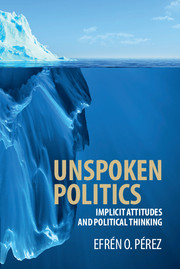Book contents
- Frontmatter
- Contents
- List of Tables and Figures
- Acknowledgments
- 1 Implicit Thoughts, Explicit Decisions
- 2 Two Ways of Thinking, Two Types of Attitudes
- 3 Implicit Expectations and Explicit Political Reasoning
- 4 Ghost in the Associative Machine
- 5 Unstated: The Measurement of Implicit Attitudes
- 6 Incognito: The Subconscious Nature of Implicit Expectations
- 7 In Deliberation's Shadow: Education, (Un)awareness, and Implicit Attitudes
- 8 In Black and White: Race, Group Position, and Implicit Attitudes in Politics
- 9 Conclusion: Implicit Attitudes and Explicit Politics
- Note on the Studies
- References
- Index
- Books in the series
3 - Implicit Expectations and Explicit Political Reasoning
Published online by Cambridge University Press: 05 March 2016
- Frontmatter
- Contents
- List of Tables and Figures
- Acknowledgments
- 1 Implicit Thoughts, Explicit Decisions
- 2 Two Ways of Thinking, Two Types of Attitudes
- 3 Implicit Expectations and Explicit Political Reasoning
- 4 Ghost in the Associative Machine
- 5 Unstated: The Measurement of Implicit Attitudes
- 6 Incognito: The Subconscious Nature of Implicit Expectations
- 7 In Deliberation's Shadow: Education, (Un)awareness, and Implicit Attitudes
- 8 In Black and White: Race, Group Position, and Implicit Attitudes in Politics
- 9 Conclusion: Implicit Attitudes and Explicit Politics
- Note on the Studies
- References
- Index
- Books in the series
Summary
We have learned that people's minds are organized into two forms of reasoning that produce two types of attitudes, each with its own attributes. But our discussion to this point has been more psychological than political. We have gained a clearer understanding of the mind's cognitive processes and attitudinal outputs. Yet we have a fuzzier sense about how these psychological insights apply to the politics of immigration: a prominent, group-centric issue that regularly captures the attention of political elites and members of the mass public (Brader et al. 2008; King 2000; Ngai 2004; Santa Ana 2002; Tichenor 2002). Sharpening this sense is crucial, for what we learn about the link between implicit attitudes and immigration politics can help us to understand how the former might affect the politics of other issues with similar features (e.g., antiterrorism, crime).
This chapter fully draws out the political implications of implicit attitudes by explaining why and how impulsive reasoning affects people's more effortful political deliberations. To meet this objective, I draw primarily on Lodge and Taber's (2013) political archetype of unconscious processing – John Q. Public (JQP). My goal here is to draw on and expand vital elements of this model to clarify how, exactly, implicit attitudes leave an imprint on people's explicit judgments of US immigration policies. I augment my theory-building efforts here by drawing on some crucial insights from the Associative–Propositional Evaluation (APE) model and the Motivation and Opportunity as Determinants (MODE) model, which I discussed in the previous chapter. These latter frameworks allow me to anticipate the possibility that under some conditions, people's implicit and explicit attitudes can pull in countervailing directions. In the case of immigration politics, for example, some people might be able to limit the influence of explicit attitude toward Latino immigrants, even as their implicit attitude toward this group boosts their opposition to immigration.
I dub my theoretical explanation “implicit expectations,” which refers to the mental process by which automatic attitudes structure citizens’ more effortful deliberations about immigration. More precisely, my framework explains how impulsive forms of thought can color people's interpretation of information about a political issue, as well as how that information is deployed in the political judgments they ultimately make. This process begins with recurring patterns in political discourse, which enable citizens to develop implicit attitudes toward protagonists in political debates (cf. Gregg et al. 2006; Rydell and McConnell 2006).
- Type
- Chapter
- Information
- Unspoken PoliticsImplicit Attitudes and Political Thinking, pp. 43 - 53Publisher: Cambridge University PressPrint publication year: 2016



